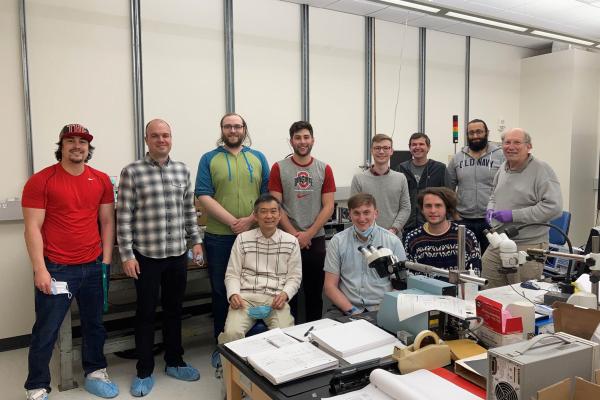1.6 Million for Upgrades of the ATLAS Particle Detector at the Large Hadron Collider

The OSU faculty, Professors K.K. Gan and H. Kagan are leading a group of undergraduate students, graduate students, post-docs, engineers and technicians in the R&D and fabrication of the state-of-the-art detectors for the ATLAS experiment at the Large Hadron Collider (LHC) at European Organization for Nuclear Research, known as CERN, in Geneva, Switzerland. These upgrades will enable the experiment to collect high quality data in the search for new particles/interactions of the fundamental constituents of material that make up this universe.
Professor Gan is leading the effort in the fabrication of the state-of-the-art optical electronics for the data transmission and control of the pixel detectors. The pixel detectors are very high-resolution cameras that take 40 million pictures a second. The optical modules are being assembled in the cleanroom in the Physics Research Building. The cleanroom hosts an array of state-of-the art equipment, funded via three Major Research Instrumentation (MRI) grants from the National Science Foundation (NSF). The facility is one of the best in the country and on par with those available at national laboratories. The fabrication projects allow undergrads and grad students to practice the art of detector fabrication.
Professor Kagan is leading the effort in the fabrication of the devices which protect the entire ATLAS experiment from extreme beam conditions and which also measure the luminosity, i.e. the number of interactions in ATLAS. Due to the extremely harsh radiation environment, the detectors are based on Chemical Vapor Deposition diamond. The fabrication of the devices and associated state-of-the-art radiation-hard electronics is a collaboration between the Physics Department and the ElectroScience Lab. The team consists of graduate students, engineers and faculty. The entire electronics readout system is being tested in the Physics Research Building on the OSU campus and will be shipped to CERN for installation.
The expected cost of the upgrades is $1.6 millions and has been funded by Department of Energy (DOE) and CERN via Brookhaven National Laboratory (BNL). The upgrades will allow ATLAS to continue to collect high quality data for the next twenty years. Students/post-docs and faculty at OSU will have access to the data to search for new physics and unravel the mysteries of the universe.
